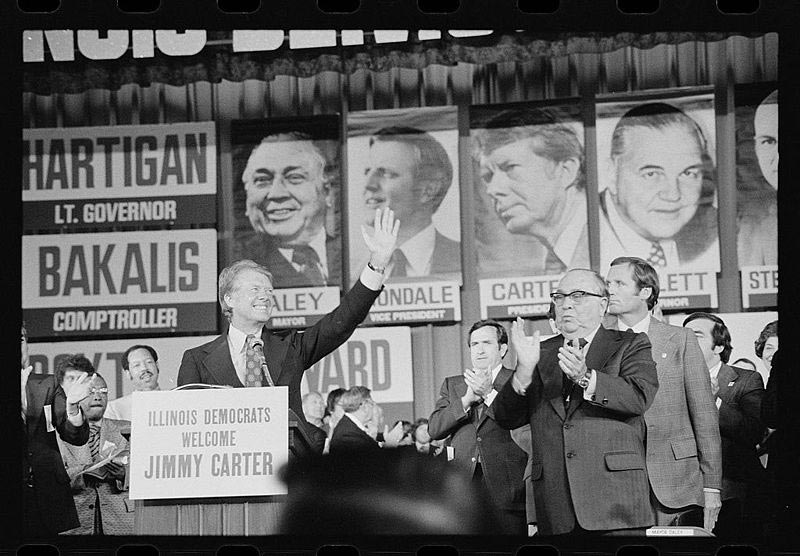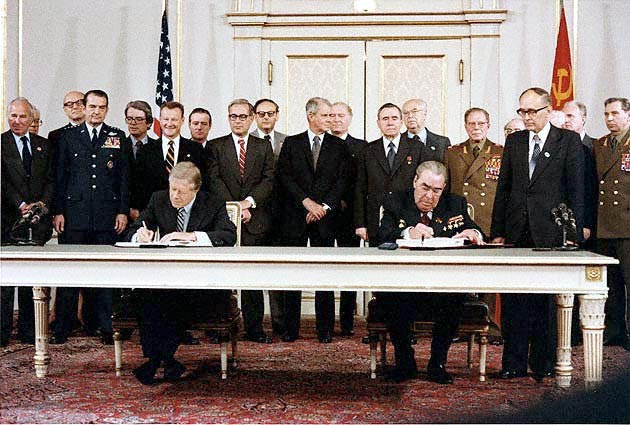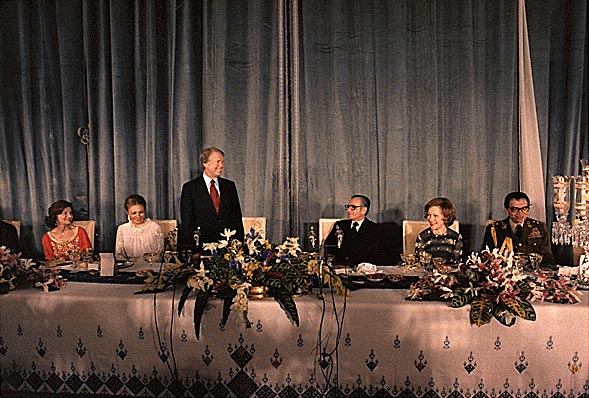| Jimmy Carter | |
|---|---|
 |
|
| 39th United States President « Previous Next » |
|
| In office | Jan. 20, 1977 – Jan. 20, 1981 |
| V. President | Walter Mondale |
| Political Party | Democratic |
| Personal Info | |
| Born | Oct. 1, 1924 |
| Religion | Baptist |
| Profession | Peanuts farmer Naval officer |
| Signature | |
| Wife | Rosalynn Smith Carter |
| Children | John William Carter James Earl Carter III Donnel Jeffrey Carter Amy Lynn Carter |
| U.S. Presidents 36-43 | |
| 36. Lyndon B. Johnson (1963-1969) | |
| 37. Richard Nixon (1969-1974) | |
| 38. Gerald Ford (1974-1977) | |
| 39. Jimmy Carter (1977-1981) | |
| 40. Ronald Reagan (1981-1989) | |
| 41. George H. W. Bush (1989-1993) | |
| 42. Bill Clinton (1993-2001) | |
| 43. George W. Bush (2001-2009) | |
| List of All the Presidents |
Jimmy Carter, born James Earl Carter Jr., was the 39th president of the United States, whose four-year term spanned from 1977-1981. He received the Nobel Peace Prize in 2002 “for his decades of untiring effort to find peaceful solutions to international conflicts, to advance democracy in human rights, and to promote social and economic development.”
In office, President Carter created new Cabinet departments: the Departments of Energy and Education. With his national energy policy, conservation, price control and new energy technologies were adapted, contributing to the progress and development that America still enjoys today. He was also active in foreign affairs, playing a major role in the Camp David Accords, which resolved the disputes between Israeli and Arabic countries. His other accomplishments in foreign conflict resolutions included involvement in the Panama Canal treaties and the Strategic Arms Limitation Talks with the Soviet Union.
Early Life and Career
President Carter was born on October 1, 1924 in a small city called Plains, in Georgia. His parents were James Earl Carter, Sr., a well-established local businessman, and Bessie Lillian Gordy, who worked as a nurse. He is the eldest of four children and was considered a clever student who was greatly fond of reading.
Carter was also an achiever during his high school years, excelling in academics and the field of sports alike. He was one of Plains High Schools star athletes in basketball and was a member of the National Future Farmers of America, where he served as the secretary of the organization’s chapter in Plains.
Carter attended college at Georgia Southwestern College, Georgia Institute of Technology and received a Bachelor of Science degree from the United States Naval Academy in 1946. He then pursued a career of service in the Navy, starting as a member of the submarine crew which served the Navy’s ships in the Atlantic and the Pacific. He then rose to the rank of lieutenant and was chosen by Admiral Hyman Rickover for the development of the U.S. nuclear submarine program. After taking up graduate studies in reactor technology and nuclear physics, Carter was appointed as a senior officer in charge of the pre-commissioning works of the Seawolf U.S. nuclear submarine.
Carter continued to serve under the U.S. Navy, being assigned on both submarines and ships of the Atlantic and Pacific fleets. With his experience and drive to excel in the career further, he acquired qualifications to command submarine operations. He aspired to be assigned the U.S. nuclear submarine program, assuming that this would be a great career move due to the fact that nuclear power options were increasingly applied in modern submarine technology. His ultimate career goal was to be the Chief of Naval Operations and felt that an extensive experience in nuclear marine technology was the fastest and most credible route to attain the promotion. He continued working on a prototype for a nuclear submarine propulsion system while stationed in Schenectady, New York.
 Carter was also involved in resolving a nuclear-related accident that happened on December 12, 1952. The NRX reactor at the Atomic Energy of Canada’s Chalk River Laboratories experienced a meltdown, causing dangerous volumes of radioactive liquid to spill because of the explosion. The NRX reactor was deemed unusable, and Carter was assigned to lead the U.S. team in helping both American and Canadian teams in the risky business of shutting down the NRX reactor. The Chalk River experience was a great influence on Carter’s views on nuclear capabilities and limitations, and led to his decision of not pursuing the U.S. neutron bomb program during his presidency.
Carter was also involved in resolving a nuclear-related accident that happened on December 12, 1952. The NRX reactor at the Atomic Energy of Canada’s Chalk River Laboratories experienced a meltdown, causing dangerous volumes of radioactive liquid to spill because of the explosion. The NRX reactor was deemed unusable, and Carter was assigned to lead the U.S. team in helping both American and Canadian teams in the risky business of shutting down the NRX reactor. The Chalk River experience was a great influence on Carter’s views on nuclear capabilities and limitations, and led to his decision of not pursuing the U.S. neutron bomb program during his presidency.
President Carter was forced to end his pursuit of a naval career due to his father’s death in July, 1953. The family needed someone to run his father’s business of selling farm and fertilizer supplies. With hard, manual labor and with the assistance of his wife, Rosalynn Smith, who assisted in the business’ bookkeeping, he turned his father’s meager business into a profitable general farm supply operation.
The success of the business made Carter one of the most successful businessmen in Plains. Running the business also enabled him to be involved more directly in the community’s affairs. He was chosen as chairman of the country school board and was elected the first president of the Georgia Planning Association. These new experiences in community leadership were what began Carter’s journey towards a political career.
Carter and Politics
Carter began his political career by being elected in the Georgia Senate in 1962. He had his first brush with the political arena in 1966, with his first gubernatorial campaign in 1966. As a senator of the 14th District of Georgia, he served as the chairman of the Senate’s Educational Committee.
Carter wanted to run for the United States House of Representatives, but opted to campaign for the gubernatorial seat of Georgia. Despite losing his first gubernatorial bid, Carter was viewed to be a strong candidate and his third-place finish in the election could be considered a great success for his young political career. Carter was elected as Georgia’s 76th governor in 1971. Besides undertaking the duties of the governor of the state, he also served other leadership positions such as chairing the Southern Regional Education Board, the Appalachian Regional Commission, The Coastal Plains Regional Action Planning Commission and the Southern Growth Policies Board. He strongly opposed racial discrimination and supported reforms in running government affairs. These reforms encourage efficiency in government operations by reorganizing state agencies, providing equal educational aid among all schools in Georgia, establishing community centers for differently-abled children and implementing educational programs for those in prison. He also introduced a program for appointing state government and judiciary officials that proclaimed all appointments be based on credentials and merit, instead of biased political favors.
The Presidential Campaign
 After three years of serving in the U.S. Senate, Carter announced his intent to run for the country’s presidential seat on December 12, 1974. He was perceived as an underdog of the presidential race since he was less-known than the other nationally-recognized candidates and politicians. He even had a name recognition rate of only two percent. However, his under-popularity, becoming an outsider and being distant from Washington D.C. proved to be an asset in winning the presidential election. The people wanted a new face and a new brand of leadership for the White House rather than the traditional politicians it had had before. Carter’s political platform was mainly centered on government reorganization and a more progressive and responsive government for the public.
After three years of serving in the U.S. Senate, Carter announced his intent to run for the country’s presidential seat on December 12, 1974. He was perceived as an underdog of the presidential race since he was less-known than the other nationally-recognized candidates and politicians. He even had a name recognition rate of only two percent. However, his under-popularity, becoming an outsider and being distant from Washington D.C. proved to be an asset in winning the presidential election. The people wanted a new face and a new brand of leadership for the White House rather than the traditional politicians it had had before. Carter’s political platform was mainly centered on government reorganization and a more progressive and responsive government for the public.
Carter’s chance of winning the U.S. presidency was evident even during the early stages of the election. He led the election early by winning the Iowa caucuses and the New Hampshire primary. He pushed his campaign faster than any other candidate, beating them to campaigning in all major regions even before his opponents could begin to do the same. He travelled at least a total of 50,000 miles, covered 37 states and delivered at least 2,000 speeches, turning the tables on his previously low popularity. Through his extensive efforts in the presidential campaign, he was noticed by the media, boosting his popularity many times over. The positive media coverage Carter had took him to the top of opinion polls. In just a matter of nine months, Carter rose to an unknown political figure to the candidate to beat in the elections. He was also perceived to be as the only Democrat who had a true national strategy, and so he won the prestigious seat in the Oval Office on January 20, 1977 by defeating Gerald Ford. His winning the Presidential elections made him the first U.S. President from the Deep South in over a hundred years, since the 1848 election.
Carter’s Presidential Office
President Carter won the election over Gerald Ford in 1976. However, it was a time of various crises, such as the continuing rise of inflation, economic recession and energy problems. To address these issues, Carter signed laws to bail out ailing corporations important to the American economy such as Chrysler. He also led government austerity measures by canceling military pay raises and encouraged energy conservation. He also led the plan to deregulate the airline industry, allowing businesses to enter and promote lower flight rates for passengers through competition. He even implemented the use of solar panels in the White House to lead in addressing the country’s energy crisis.
 One of President Carter’s key accomplishments on the national level was handling a national emergency of the Love Canal located in the city of Niagara Falls in New York. There were at least 800 families saved from toxin and radiation exposure, as they were unknowingly living atop a toxic waste landfill. By virtue of the Superfund Law, government funds were used to demolish at least 500 houses, schools and structures sitting on the toxic area. This prompted the search for more similar cases across the country in order to rescue citizens from disease and ailments that may be caused by these harmful radiations.
One of President Carter’s key accomplishments on the national level was handling a national emergency of the Love Canal located in the city of Niagara Falls in New York. There were at least 800 families saved from toxin and radiation exposure, as they were unknowingly living atop a toxic waste landfill. By virtue of the Superfund Law, government funds were used to demolish at least 500 houses, schools and structures sitting on the toxic area. This prompted the search for more similar cases across the country in order to rescue citizens from disease and ailments that may be caused by these harmful radiations.
Carter’s presidential term is also highlighted by his accomplishments in foreign conflict resolutions. One key involvement of President Carter was in calming the differences between Israeli and Arabic countries which was done through the Camp David Accords. He also passed the jurisdiction of the Panama Canal to the government of Panama, and signed the Strategic Arms Limitation Treaty, or SALT, with the Soviet Union to control the nuclear arms possessed by both the U.S. and the USSR, which were considered the world’s nuclear superpowers.
 His final year as President, which was on 1980, was marred by the Iran Hostage Crisis, wherein 50 U.S. nationals were held hostage for 444 days by a group of Islamic militants. Because of failed negotiations, the U.S. opted to use military force to rescue the hostages. Unfortunately, the mission was a failure, resulting in the deaths of eight U.S. soldiers and one Iranian civilian, and the destruction of two U.S. aircrafts. This and other factors contributed to his unsuccessful campaign for reelection. Coupled with opposition against stronger candidates and the dwindling support for the groups who played a major role in his first victory, Carter lost his bid for reelection to Ronald Reagan.
His final year as President, which was on 1980, was marred by the Iran Hostage Crisis, wherein 50 U.S. nationals were held hostage for 444 days by a group of Islamic militants. Because of failed negotiations, the U.S. opted to use military force to rescue the hostages. Unfortunately, the mission was a failure, resulting in the deaths of eight U.S. soldiers and one Iranian civilian, and the destruction of two U.S. aircrafts. This and other factors contributed to his unsuccessful campaign for reelection. Coupled with opposition against stronger candidates and the dwindling support for the groups who played a major role in his first victory, Carter lost his bid for reelection to Ronald Reagan.
Life outside the White House
Jimmy Carter went back to the domestic life by going back to Georgia to manage his peanut farm. However, his problems were not over because his trustees had mismanaged the business, leaving Carter with over a million dollars in debt. He then lived an active life, writing books, teaching at Emory University in Atlanta, Georgia and establishing the Carter Center with the end view of protecting human rights, promoting democracy and supporting fair elections. The Carter Center also worked to help those in need of medical aid, and to promote developments in global health such as eradication of disease. Research and development from the Carter Center led to the elimination of the guinea worm disease which had previously affected 3.5 million victims. Retaining the Carter legacy on resolving conflicts, the Center continued to help mediate in international conflicts in Haiti, Bosnia, North Korea, Sudan and Ethiopia.
The Nobel Peace Prize
Jimmy Carter’s efforts in running the Carter Center to “find peaceful solutions to international conflicts, to advance democracy in human rights, and to promote economic and social development” awarded him the highly-coveted Nobel Peace Prize in 2002. He is the only U.S. president to win the Prize after his presidential term and only one of the two native Georgians, aside from Martin Luther King, Jr. to receive the prestigious award.
Civilian Life
Jimmy Carter and his wife Rosalynn continues to work for helping those in need. Besides the Carter Center, they also do volunteer work for the Habitat for Humanity, a Georgia-based organization that helps low-income people to buy and build decent homes. Carter teaches Sunday school and is actively involved as a deacon in the Maranatha Baptist Church in Plains.
Jimmy Carter enjoys woodworking, painting, fishing, tennis and skiing in his spare time. He and Rosalynn have three sons and one daughter, who gave them eight grandsons, three granddaughters and two great-grandsons. Seemingly following their dad’s footsteps, their two sons also pursued political careers, the eldest, Jack, being the Democratic nominee for the U.S. senate in Nevada in 2006, and Jason, being elected to the Georgia State Senate in 2010.